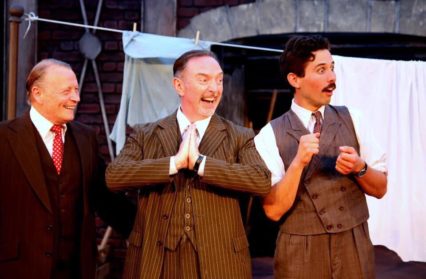Thomas Tyrrell attends Everyman Theatre’s traditional but enjoyable open-air production of Much Ado About Nothing.
Everyman Theatre’s Shakespeare productions are becoming an annual ritual for me: over the past couple of years I’ve seen a thoroughly charming As You Like It set in Ireland and a punchy Merchant of Venice set in the world of 80’s high finance. For this production of Much Ado About Nothing, David Mercatali takes the safer and more obvious route of setting the play in the great nation of Wales during the Second World War. This has advantages: the switch from Messina to Maes-y-Coed is easy on the ear, and gets a reliable laugh. Music is rather underserved in this production, which omits both of Shakespeare’s songs, but the entry of the romantic leads singing “Men of Harlech” and the final choral number are moving and well-delivered.
There’s a risk, however, that using so familiar a setting risks turning the play into a Welsh Dad’s Army, making it just as hidebound as if it were performed in Elizabethan costume. It’s a risk the play doesn’t entirely avoid—a volunteer company has to take what they can get, but there’s a notable lack of diversity in the all-white cast that we haven’t seen in previous Everyman productions. Recasting many of the smaller roles as female lends a pleasing verisimilitude to the picture of a community whose men have gone to war, but there’s none of the flamboyant gender-swaps and drag acts that have marked recent RSC productions. The larger dramas of World War Two are pretty much forgotten after the first scene, and there’s no hint of political subtext in this cricket-playing, middle-class idyll of rural Wales.
Still, there’s nothing wrong with a traditional staging of Much Ado if the performances hold up, and Jess Courtney and Luke Merchant crackle as Benedick and Beatrice, the quarrelling duo whose friends fool them into thinking they’re in love with each other. Their fiery exchanges are still the play’s highlight. Merchant is energetic and endearingly puppyish as Benedick, and though I would have liked Beatrice to come forward and bounce around the seating area as exuberantly as he does, she has enough force and verve to be more than his match in argument.
Of the play’s other couple, Ben Barnard gives us a Claudio who is about as marriageable as Mr Collins, and spends the play alternately squealing, smirking or sulking. Shakespeare only knows what Llinos McCann’s Hero must see in him, but she manages to incorporate some amusing comedy business and does a good job with a rather bland role. A swift, trim script makes the first half fly by pleasantly, though without any moments to make the audience really sit up and pay attention.
Only when the second act begins does this production unveil its secret weapon, all the more delightful for being so unexpected. Douglas Adams once said that there is nothing worse than watching a certain type of old Shakespearean actor valiantly trying to ham it up as Dogberry. More credit to Sarah Bawler, then, for managing to steal the show with a comic role that so often comes across as tiresome. Her use of expression is boundlessly entertaining and her double-act with Phil Gerkin’s Verges crackles with chemistry. More than that, she’s one of the few characters to make good use of the Welsh setting; her characterisation of Dogberry as a woman more fluent in Welsh than English instantly rationalises the character’s unending string of malapropisms. Unquestionably the highlight of this production, her performance left the whole audience wanting more, and I should like to see her play Falstaff.
Energised by Bawler’s performance, the second act outshines the first—the action is darker and pacier, the comedy is funnier, and the verbal war between Benedick and Beatrice steps up a notch. If, in the end, we’re left with a thoroughly traditional Much Ado that doesn’t do much to print its own signature on the plot, we also have a play that benefits from a swift pace and assured performances, and which shines out in quite unexpected areas.
For more details about the Cardiff Open Air Theatre Festival, visit their website.
Thomas Tyrrell has a PhD in English Literature from Cardiff University and is a regular contributor to Wales Arts Review.












